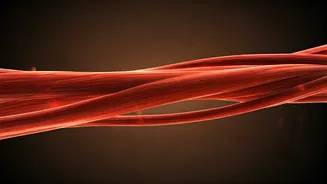Muscle Tension Rising
When you wrap up your workout and skip the stretching, your muscles don't just magically return to normal. Instead, they can remain in a state of tension.
This means the muscle fibers stay contracted, leading to a feeling of tightness and restricted movement. Imagine your muscles as rubber bands that have been stretched and strained. Without proper cool-down, they don’t loosen up. Over time, this constant tension can contribute to chronic pain and discomfort, making everyday activities less enjoyable and potentially leading to more severe issues.
Poor Blood Flow
Stretching also aids blood circulation, which is crucial for muscle recovery. Exercise causes your muscles to demand more oxygen and nutrients, which the blood carries. When you don't stretch, the blood vessels in those muscles can remain constricted. This is known as poor circulation. This slower delivery of oxygen and nutrients means that waste products aren’t cleared away as efficiently. As a result, muscle recovery slows down. This can lead to increased muscle soreness and a longer recovery time between workouts. Proper stretching encourages blood flow to deliver nutrients and remove waste efficiently.
Injury Risk Increases
Skipping post-workout stretching significantly elevates your risk of injury. Tight muscles are less flexible and more prone to tears or strains. Think of it like bending a stiff piece of wood versus a flexible one. Muscles that haven't been stretched are unable to move through their full range of motion easily. Suddenly putting stress on inflexible muscles increases the likelihood of pulling a muscle or other soft tissue injuries. Regular stretching improves flexibility, allowing muscles to move through a full range of motion. This enhanced flexibility reduces the risk of injuries during future workouts and in everyday life.
Muscle Soreness Intensifies
Delayed Onset Muscle Soreness (DOMS) is the unwelcome guest that often shows up after an intense workout. Ignoring stretching can make DOMS even more noticeable. During exercise, microscopic tears occur in your muscle fibers. Stretching helps to repair these tears by increasing blood flow. Without stretching, this recovery process is less efficient, causing the soreness to last longer and feel more intense. Furthermore, lactic acid buildup, a byproduct of exercise, is better cleared from your system when you stretch. This is why a proper cool-down, including stretching, significantly reduces muscle soreness and speeds up your recovery.
Flexibility Takes a Hit
Flexibility is a key component of overall physical fitness. Regular stretching is essential for maintaining and improving it. When you skip stretching, your muscles tend to shorten and become less flexible. This reduced flexibility can affect your posture, your range of motion, and even your balance. Think of it as your body becoming stiffer over time. With less flexibility, simple movements can become challenging, and you may find yourself feeling restricted in your daily activities. This is why consistently incorporating stretching into your routine is vital for maintaining a healthy, flexible body.
Slowed Recovery Times
One of the most significant consequences of not stretching is a prolonged recovery period. When you work out, your muscles experience stress. Stretching aids in the removal of waste products like lactic acid and supplies the muscles with essential nutrients for repair. If you skip stretching, this recovery process becomes less efficient. This results in muscle damage staying longer and increased inflammation. As a result, your body needs more time to repair itself before you're ready for another intense workout. Proper stretching and cool-down shorten recovery times, allowing you to get back to your exercise routine sooner.
Mental Fatigue and Stress
The effects of not stretching can also extend to your mental state. Exercise is known to release endorphins, which boost your mood. However, if you're experiencing tight muscles and delayed recovery due to a lack of stretching, the benefits can be diminished. The physical discomfort can lead to increased stress and even feelings of frustration. Additionally, the longer recovery times and potential for injury can create anxiety about your next workout. Incorporating stretching into your post-exercise routine contributes to both physical and mental well-being, helping you manage stress and maintain a positive attitude.
Performance Diminishes
Skipping post-exercise stretching will likely lead to reduced athletic performance over time. Tight muscles restrict movement, reducing power and agility. Without stretching, the risk of injury increases, which can also sideline you from training. When your muscles don't recover effectively, they become less efficient, impacting endurance and strength. For athletes or anyone who wants to improve their fitness, this is a significant factor. Proper stretching optimizes the body's mechanics, promotes efficient movement, and reduces the likelihood of injury, all of which contribute to better performance in any physical activity.













